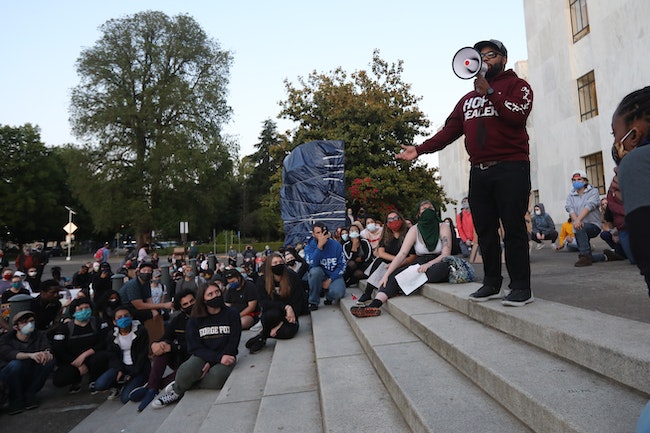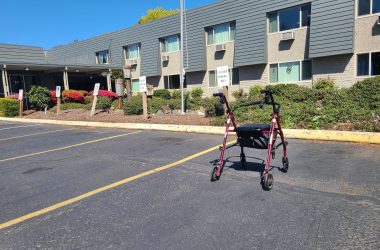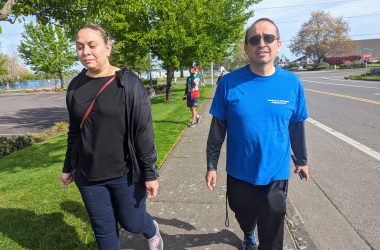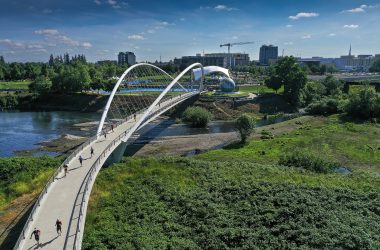 Zack Jackson speaks to protestors on the Oregon State Capitol steps during the third night of demonstrations against police violence on Monday, June 1. (Amanda Loman/Salem Reporter)
Zack Jackson speaks to protestors on the Oregon State Capitol steps during the third night of demonstrations against police violence on Monday, June 1. (Amanda Loman/Salem Reporter)
Five days of protests and marches over the death of George Floyd have catalyzed discussions around race and policing in Salem that many black residents say are long overdue.
At protests and in meetings and interviews this week, black Salemites said Floyd’s death has brought broader attention to issues they’ve discussed for years, including racial profiling by local law enforcement and Salem residents.
“George Floyd’s like the water drop that created the tsunami. It’s just another incident in a long history of police brutality,” said Oni Marchbanks, a Salem activist who leads equity and anti-racism workshops. “We as black people, we live this thing. Every day we experience the results of unchecked biases and I think really that’s where it starts.”
Shelaswau Crier, a legal instructor and civil rights consultant and former law professor at Willamette University, thinks back to an incident about six years ago, when a white man called police to report her 16-year-old son as a suspicious person while the boy was waiting for the bus to go to morning classes at South Salem High School.
Crier obtained a copy of the 911 tape, which she’s since used in community presentations.
The man who called the police emergency line followed her son’s bus to school, she said, waiting until officers arrived. On the 911 call, Crier said the dispatcher approved of the caller for following her son. A school resource officer later told Crier the department finds it helpful when people follow potential suspects to provide more accurate location information.
“You’re setting things up for a very dangerous situation by greenlighting civilians following others,” Crier said.
The situation reminded her of the killings of other young black men shot deemed “suspicious” by vigilantes. The victims often were walking or jogging in their own neighborhoods.
Crier’s son wasn’t arrested or charged with a crime, but even after officers stopped him and searched his bag, Crier said dispatch audio suggested officers should follow up and confirm he was a student at South. He missed his jazz choir class because of the stop.
She said the police officer who spoke with her didn’t understand why she wanted him to contact the caller to let him know her son was not a criminal suspect or a suspicious person.
“This man now knows where my kid catches the bus and what time he catches the bus five days a week,” she said. “There was nothing I could say to get the officer to understand my concern.”
 A Salem-Keizer NAACP meeting on June 1, 2020 became a community forum as residents discussed racial profiling and how Salem police have responded to protests over the death of George Floyd (Screenshot of Facebook Live feed)
A Salem-Keizer NAACP meeting on June 1, 2020 became a community forum as residents discussed racial profiling and how Salem police have responded to protests over the death of George Floyd (Screenshot of Facebook Live feed)
Crier and other black Salem residents interviewed said nearly every black person in Salem shares a similar story – one where they or a family member were stopped, questioned and assumed to be suspicious by either police or non-black residents while going about their daily business.
Many described fearing for their children’s safety when out in public or knowing certain Oregon towns aren’t safe to travel in after dark.
“There’s a select group of people who are aware and try to make others aware but I think the vast majority of white residents in Salem are unaware or are in total disbelief,” Crier said. She said Salem residents often see the area as “this bubble of peace and progressivism – we like trees, people are nice and it’s fine here.”
In 2017, a new Oregon law required the Criminal Justice Commission to collect and publish data about the race and gender of people police stop while driving and walking. The data reflects interactions where police are deciding which community members to stop, rather than when they’re responding to calls.
The first report for the Statistical Transparency in Policing, or STOP, program was published in December. It analyzed one year of police stops for Oregon’s 12 largest law enforcement agencies, which include Salem Police and the Marion County Sheriff’s Office.
In Salem, about 3.3% of people police stopped were black, though black residents are about 1.5% of the city’s population, according to the report. Researchers analyzed data in several ways, taking into account time of day and other factors like location, and found differences in stops weren’t statistically significant in Salem, but noted it’s difficult to draw definite conclusions because Oregon’s black population is relatively small.
Police stopped Hispanic residents at about their same share as the city’s population, 21% of the time.
When Salem police searched black and Hispanic residents as a result of those stops, both groups were slightly less likely to have drugs, weapons or other contraband than white residents stopped, though the report said those differences weren’t statistically significant.
Kenneth Sanchagrin, the STOP director, said the report does not disprove residents’ concerns about being overpoliced or disproportionately stopped, though the models did not find evidence of systemic bias from Salem police. More data collection in coming years will give residents a better assessment of who police are stopping and searching.
Analyzing discretionary police stops also can’t show whether Salem citizens are more likely to call police about suspicious behavior for black residents, he said.
Marchbanks said conversations locally and nationally tend to be about the behavior of protesters and not the reason they are protesting.
“You keep talking about the what. If you keep talking about the what, you ignore the why and the why needs to be addressed,” she said.
Selective enforcement by police is one issue, but Marchanks said there are broader problems with equity in Salem, such as access to wealth and healthcare.
Black Oregonians have the highest poverty rate of any racial or ethnic group in the state, according to Census data, with about 20% living in poverty.
Despite Salem’s growing racial and ethnic diversity, decisionmakers from the Salem City Council to state agencies remain almost entirely white, she said.
“When disparities happen and budgets get cut, guess what’s the first thing to go? It’s the diversity and equity position,” Marchbanks said.
Marchbanks said she wants to see police officials working to understand their own biases and bring in black people to speak to officers about racial equity. She said training and discussions about “diversity” too often sideline race and rely on white presenters to educate people about black experiences.
Many concerns about local policing came up in a Monday evening meeting of the Salem-Keizer NAACP, which evolved into a community forum as elected officials, civic and religious leaders flooded the Zoom call, and President Benny Williams moderated a conversation with Deputy Police Chief George Burke and Marion County Sheriff Joe Kast.
In the meeting, Williams said Floyd’s death highlights systemic issues beyond the conduct of a single officer, noting that Derek Chauvin, the former Minneapolis police officer now charged with murdering Floyd, had a history of citizen complaints about his behavior but had never faced significant discipline.
He said while Salem hasn’t seen a similar incident, communication between police and community members can always be improved, something law enforcement leaders agreed with.
“It shouldn’t just be at these moments. We should be doing this all the time,” Kast said.
Burke said community trust needs to be built constantly, not just when tensions are high.
“When we’re in crisis, that’s not the time to build a relationship,” he said.
 Salem-Keizer NAACP President Benny Williams leads the 2020 Martin Luther King Jr. Day march out of the McKay High School parking lot (Rachel Alexander/Salem Reporter)
Salem-Keizer NAACP President Benny Williams leads the 2020 Martin Luther King Jr. Day march out of the McKay High School parking lot (Rachel Alexander/Salem Reporter)
In an interview, Williams said Salem Police Chief Jerry Moore has been a strong leader for the department and credited him for listening to NAACP leaders and working to keep tensions between police and the community in Salem low. But he said profiling is still a real concern, and the NAACP’s priority now is monitoring the selection process for a new chief when Moore retires this year.
Williams said local law enforcement agencies haven’t kept pace with Salem’s changing demographics, with officers patrolling the streets remaining largely white even as the city has become more diverse. Salem is about two-thirds white, according to Census data, with black residents making up between 1 and 2% of the population, about 2,500 people.
“We’ve got to end up doing something and finding a way of improving the reflection of our police force,” he said in the NAACP meeting. “This is one of the demands out of this protest.”
Marion County has six black sworn law enforcement officers, about 3% of the force, according to data from the federal Equal Opportunity Employment Commission. About 8% of the force is Hispanic, a far smaller share than Salem’s population.
Spokesman Sgt. Jeremy Landers said Kast wasn’t available for an interview Wednesday, but said the department typically holds annual training about implicit bias or protected classes.
“Having a workforce that is diverse and reflective of the community they serve should be a goal of all law enforcement agencies. While we are proud of the growing diversity of our team here at the sheriff’s office, it’s an ongoing effort to continue to recruit a diverse workforce,” Landers said in an email.
Salem police have one black officer on a force of 182, and 15 Hispanic officers, about 8% of the force, according to data provided by department spokeswoman Lt. Debbie Aguilar.
Aguilar said the department included bias training in its 2018 and 2019 sessions for officers.
SUPPORT SALEM REPORTER’S JOURNALISM – A monthly subscription starts at $5. Go HERE. Or contribute to keep our reporters and photographers on duty. Go HERE. Checks can be sent: Salem Reporter, 2925 River Rd S #280 Salem OR 97302. Your support matters.
Contact reporter Rachel Alexander: [email protected] or 503-575-1241.
RELATED COVERAGE:
Salem police chief justifies different treatment for armed civilians downtown during curfew
Salem imposes weeklong overnight curfew to quell trouble, still allowing demonstrations
Hundreds gather for vigil, march in third night of Salem protests over George Floyd’s death

Rachel Alexander is Salem Reporter’s managing editor. She joined Salem Reporter when it was founded in 2018 and covers city news, education, nonprofits and a little bit of everything else. She’s been a journalist in Oregon and Washington for a decade. Outside of work, she’s a skater and board member with Salem’s Cherry City Roller Derby and can often be found with her nose buried in a book.









